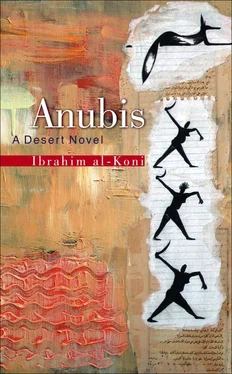She was breathing heavily and chewing moodily, as if brooding. Despair, anxiety, and malice were visible in her eyes. I stretched out my hand to stroke her front leg, but she pulled it away and thumped her chest a mighty blow. I drew myself up on my elbows, but she did not soften toward me. I was caught off-guard when she jumped in the air to begin pummeling me with her feet. She hit my head, my right shoulder, and my left knee, and had I not sheltered myself by the acacia’s trunk, I would not have escaped her mischief. I was obliged, in order to mollify her, to massage her body with both hands: once in the animal yard in the morning, a second time out in the grazing lands at midday, and a third time back in the yard in the evening.
This relationship was not destined to last long, however, for the leader of a caravan, wishing to lavish gifts on me out of appreciation for the water, deposited a woman beside me, saying that he had purchased her in the forest lands and had decided to leave her in my custody to assist me with my daily chores. She was of mixed race, a skittish, comely, jumpy, excessively wary creature, who seemed ready to flee or to pounce. I soon had to acknowledge that she had awakened in my heart the whispers I had forgotten since the spirit world separated me from my lost she-jinni from whom I once learned some things. So it was not long before I was searching for my forgotten reality in this new creature’s embrace, which did not bring me happiness. The new she-jinni did not trust me, despite her pretence at amiability. I observed how skeptical of me she remained over the course of the following days. I do not deny that I occasionally had pleasure with her, but I could not claim it was fully satisfying. Because she lacked the kind of beauty I had lost when I lost the gazelles, this pleasure was lackluster. In the beginning, I suspected that her indifference, skittishness, and wariness were symptoms of fear, perhaps a result of a longing for the solitude to which she was accustomed in her forest land. Subsequently I discovered that these characteristics were to the contrary a hankering to be close to other people and a desire for contact with villages. So she awakened in me my old sense of being an orphan, of solitude, and of being at my wits’ end. Then I punished her by avoiding her. I acted condescending and holed up in the caverns of the ancestors for two consecutive nights. I abandoned her, feigning disdain for her gifts. The truth was, however, that I was not as liberated from the suzerainty of her embraces as I had imagined, for whispered temptations troubled me both nights I spent in the caves of the southern cliff faces more than at any time before. I realized that this she-jinni had soothed me more than anyone I had ever known before. So I hastened to rejoin her as soon as I saw her at the edge of the wadi, after I had descended the mountain on my return to the oasis. Yet I pretended not to see her and went to pet the she-camel at the bottom of the valley, because I have discovered that a creature who thirsts for the beauty he once found with gazelles is fated to recapture his dream only with she-camels, whose eyes flash with the gazelles’ spirit.
I petted the she-camel, and the she-jinni stealthily trailed after me. I chanted to my gentle creature a song of longing, and my beloved grunted her pain and shared her suppressed sorrow with me. Despite preoccupation with this intimate conversation and despite being lost in the world of song, I was aware that the she-jinni was pursuing me. She disappeared behind a low hill separating the cliff face from the valley bottom. My beloved camel thrust her long neck against my chest, and I embraced her. I whispered to her that I loved her because she bore in her eyes the look of another beloved creature that had carried me in her body when I was on the point of perishing of thirst and had also returned to bear me once more the day I lost my father and my truth. The poor creature moaned in distress and swayed from right to left like an ecstatic religious celebrant overwhelmed by grief. The she-jinni, whom I had forgotten in my crazed dance, then ruined everything by suddenly popping up, as she-jinnis will. The beloved camel beside me took fright and bolted.
The she-camel fled, and I found myself standing face-to-face with a creature far more hideous than the she-jinni, one more like a she-demon. I forced myself to smile at her, but the evil look I saw in her eyes frightened me. So I retreated, but she did not approach me. She glared maliciously at me and then departed. She climbed the hill and vanished at a curve in the valley, where it stretched northward.
I tried to forget, but the whispered temptations would not cease. These frightened me more than the threat in her eyes, because I knew that such a threat is generally an empty one, whereas an idée fixe is nothing more or less than a prophecy. It seems that what I had learned was confirmed on this occasion as well, because I discovered beauty’s paragon dead the next morning. I did not for a moment doubt that the she-jinni had plotted this outrage. I found the she-camel in the animal yard, all swollen up, her eyeballs protruding, with suspicious-looking snot oozing from her nostrils. I was certain that the she-jinni had given the camel poison mixed with dry grass. I pursued her to rebuke her for her deed, but she bared her teeth at me like a jackal and then pelted me with a hail of abuse in the forest dwellers’ gibberish. So I left her and went off by myself to the open spaces to seek inspiration for some wily subterfuge. I told myself that a creature who plots the destruction of a fellow creature is a past-master of evil who will stop at nothing and that unless I succeeded in limiting this evil I would be its next victim, without the slightest doubt. I went to her and lured her into a conversation about the secrets of the caves. I did not tell her about the ancestors’ prophetic aphorisms, not merely because I felt sure her community would disdain prophetic wisdom and anything linked to the ancestors but also because of her instinctive hostility toward these riddles, which she considered trumped-up superstitions devoid of truth. All the same, I sang for her, under my breath: “Wherever you come from, there you’ll return, for man, like a caravan, would not be man, unless he returned to his point of departure.” Then, out loud, I told her about the secrets awaiting her in the caverns and the other things the ancestors had hidden, treasures that they had been unable to carry with them into eternity and had been forced to stash in tombs at the foot of the walls. In my narration, I substituted earthly treasures for the heavenly ones. I recited verses about the earthly legacy but kept silent about the eternal legacy. Curiosity flared in her breast, and she followed me like a shadow. I took her by the heights and scaled the boulders of the southern cliff faces, chanting to myself the law of arrival and departure while my tongue kept extolling the vaunted treasures. I followed twisting trails and cut back and forth between rugged boulders. I crossed passes, ridges, and peaks that I had reconnoitered during my explorations in the southern redoubts in the past. I caught sight of the escape route at last, for I noticed the secret cleft that had brought me to the labyrinth when I crossed through it one day, searching for my brethren from the herds’ clans.
I slipped through the forbidding cleft, and my shadow slunk through behind me. I crossed to the other side and traversed in this stage a distance long enough that our tracks would disappear. Then I turned to toss a question her way: “Are you a jinni or a person?”
She smiled at me blankly but did not reply. She may have thought the question senseless. She may have suspected that I was merely joking. In any case I said, “You arrived at my oasis borne on the steeds of the jinn, and a demon jinni placed you in my custody. Is it reasonable that you would be of any lineage other than the jinn?”
Читать дальше












